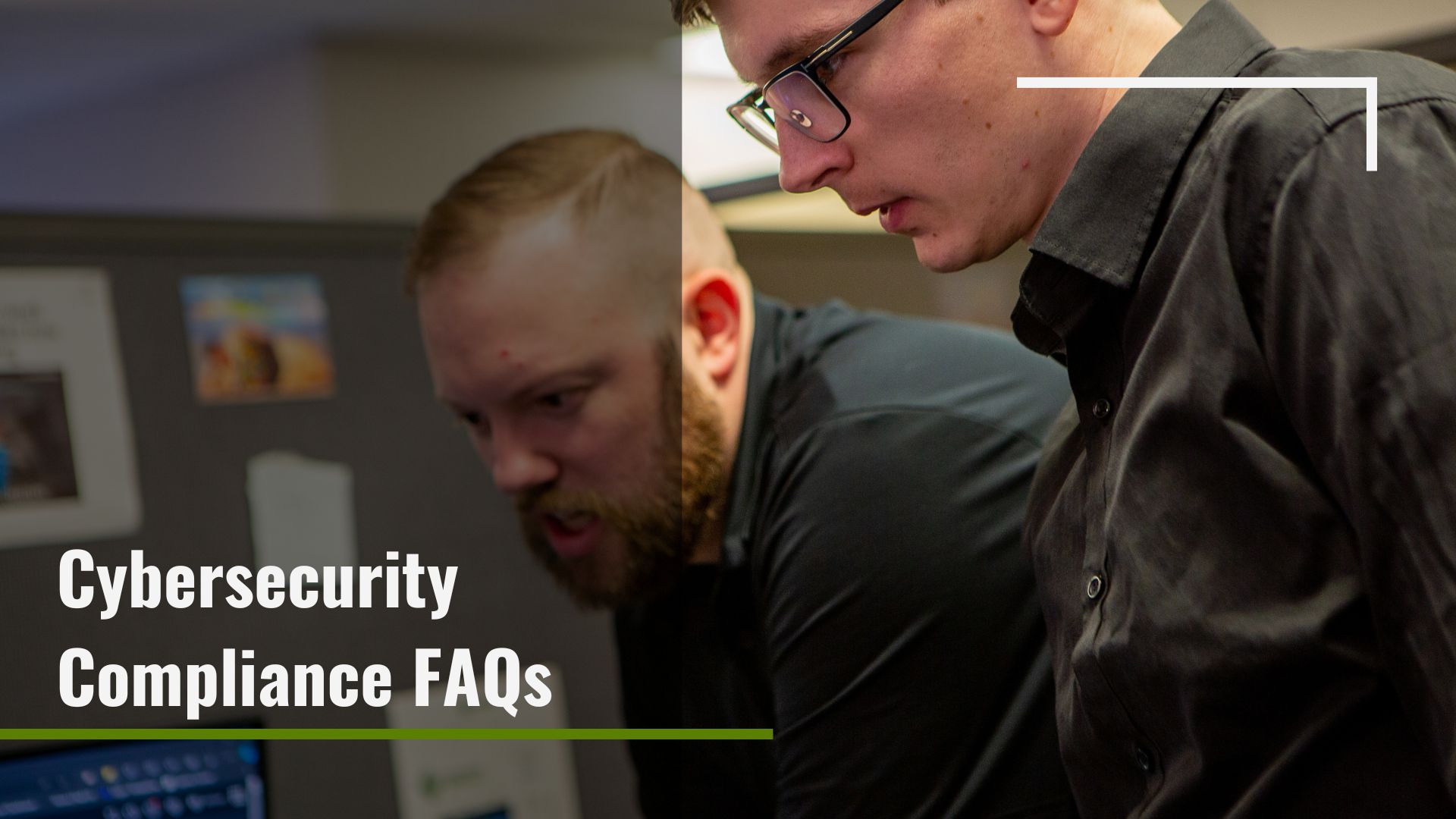Cybersecurity Compliance: What Is It and How Can My Business Stay Compliant?

Did you know Google, one of the biggest companies in the world, paid $57 million in non-compliance fees for failure to disclose data collection processes? Even the most successful companies need help with compliance.
What Is Security Compliance?
Cybersecurity compliance is meeting the security requirements relevant to your industry. All industries have different security standards because they store various kinds of data.
All companies must meet their standards to host sensitive information and continue operating. Many outsourced managed services providers offer compliance solutions to ensure your business meets the proper standards and keeps data safe from unauthorized users.
Security compliance includes:
- Certifications
- Cybersecurity measures
- Vulnerability/risk assessments
- Periodic 3rd Party Audits
Frequently Asked Questions About Cybersecurity Compliance
If you’re confused about cybersecurity compliance, what it means, and what to do to meet your industry standards, you’re in the right place. Here are some frequently asked questions about cybersecurity compliance to help you better understand its aspects:
Why Do I Need to Worry About Cybersecurity and Compliance?
Businesses of all sizes should pay close attention to cybersecurity and compliance because they’re vital to your organization’s success. Compliance regulations exist to keep your data safe. If a business doesn’t meet industry standards, they’re vulnerable to data breaches.
Implementing cybersecurity measures and meeting compliance standards help keep customer, corporate, and personal data safe from unauthorized users or cybercriminals.
Why Do Industries Have Different IT Compliance Standards?
Different industries have different compliance standards; Whether it’s CMMC, IRS 1075, NIST CSF or many others, because they don’t store the same information types. Healthcare industries store Personal Healthcare Information (PHI) and Personal Identifiable Information (PII). Financial businesses store credit card numbers and bank statements (PCI and PII). Defense contractors and subcontractors store Controlled Unclassified Information (CUI). Tax preparation companies store Federal Taxpayer Information (FTI).
So, what are your industry’s cybersecurity compliance requirements? Use this guide to determine what IT compliance standards your business must meet:
IT Compliance Standards By Industry
Every industry has specific IT compliance standards. Here are the requirements for industries that are vulnerable to data breaches:
Healthcare Industry and Legal Industry
Healthcare and legal businesses must comply with the following standards:
HIPAA (Health Insurance Portability and Accountability Act)
Enacted in 1966, HIPAA is a federal law that created national standards to protect private patient information and required patient consent to release that information. All healthcare providers, doctors, and other healthcare facilities must comply with HIPAA.
This act keeps sensitive patient data out of the hands of unauthorized users and creates an extra layer of security for patients.
PCI DSS
Healthcare and legal facilities that accept payment cards must meet security standard PCI DSS (Payment Card Industry Data Security Standards). This requirement helps prevent card fraud and personal data theft and is internally recognized.
Fines for PCI DSS non-compliance range from $5,000 to $100,000 per month, depending on your business’s size.
BAA
BAA, Business Associate Agreement, is a written agreement that defines each party’s responsibilities related to Personal Health Information (PHI). This agreement helps protect patient data.
Financial Industry
GBLA (Gramm-Leach-Bliley Act)
The Gramm-Leach-Bliley Act allows insurance companies, commercial and investment banks, and credit unions to work with the same organizations safely. This act ensures client information is securely protected and safe from unauthorized users.
PCI DSS
Like the healthcare and legal industries, financial institutions must meet PCI DSS requirements because they manage and store financial records and credit card numbers.
Education Industry
Educational institutions must meet the following cybersecurity compliance standard:
FERPA (The Family Educational Rights and Privacy Act of 1974)
FERPA is a federal law that ensures the privacy of student education records. All schools that receive funding from the United States Department of Education must comply with FERPA.
This act allows parents and eligible students to:
- View the student’s educational records to check for accuracy
- Correct any misleading information
- Ask for amendments
Government Agencies
Government institutions must meet these compliance standards:
FedRAMP (Federal Risk and Authorization Management Program)
All businesses that operate for or with the federal government and require cloud-based services must meet FedRAMP standards. This program provides cost-effective, risk-preventing cloud services for federal agencies. It gives government institutions access to convenient, secure cloud storage with extra security.
FISMA (Federal Information Systems Management Act)
Government agencies must meet FISMA standards which include:
- Maintaining an inventory of IT systems
- Organize data by risk levels
- Use security controls
- Complete regular risk assessments and vulnerability scans
- Continuously monitor networks
- Implement a system security plan
The above requirements keep federal records safe from outside users.
CMMC (Cybersecurity Maturity Model Certification)
Contractors and subcontractors that work with the Department of Defense must meet CMMC standards. CMMC expands upon DFARS 252.204-7012 and includes a third-party audit and certification requirement. It represents an evolution of DoD efforts to safeguard federal contract information (FCI) and controlled unclassified information (CUI) processed by the DIB.
IRS 1075
Any firm handling Federal Taxpayer Information (FTI) must adhere to either the IRS 1075.
Compliance for Cybersecurity Insurance
All cybersecurity insurance policies require compliance standards in order to have claims paid out in full.
National Institute of Standards and Technology Cybersecurity Framework (NIST CSF)
The Framework Core consists of five concurrent and continuous functions:
- Identify
- Protect
- Detect
- Respond
- Recover
These functions provide a high-level, strategic view of an organization’s management and cybersecurity risks. The Framework Core identifies underlying key categories and subcategories for each function, and it matches them with informative references such as:
- Existing standards
- Guidelines
- Practices
The Importance of Cybersecurity Compliance Audits
Cybersecurity compliance audits are valuable because they ensure your business meets relevant compliance requirements. Audits not only enhance your cybersecurity measures, but they also allow your business to run safely and efficiently.
Many managed services providers (MSP) complete cybersecurity compliance audits to test your network for compliance and enhance its safety.
Where Can I Get Help With Cybersecurity Compliance
Do you want to ensure your organization is compliant with relevant cybersecurity regulations? G6 – Military Grade IT is here to help. With 15 years of cybersecurity compliance experience and an army of high-quality cybersecurity measures, the G6 unit helps prevent non-compliance and associated fees.
We have a 98% customer satisfaction rate, 90% customer retention, and the expertise and attention to detail of American veterans; G6 does it all.G6 is a Veteran Owned Small Business (VOSB) that employs a majority of Military Veterans from the Marine Corps, Navy, and Army. We’re your one-stop shop for all things IT from cybersecurity and compliance to cloud and infrastructure management.
Contact our experienced team today to meet your compliance goals and secure your network.

